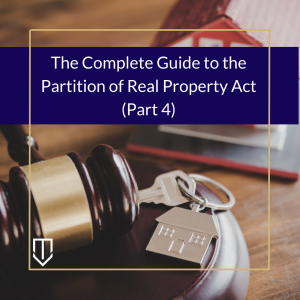 This is a continuation of our ongoing series on the Complete Guide to the Partition of Real Property Act. For complete comprehension, we would suggest starting from the beginning.
This is a continuation of our ongoing series on the Complete Guide to the Partition of Real Property Act. For complete comprehension, we would suggest starting from the beginning.
As a quick summary, the Partition of Real Property Act is a law specific to California, passed in July 2022. (Stats 2022 Ch. 82 § 3 (AB 2245).) It brought significant changes to how partitions are conducted in the state, if the underlying parties are tenants in common. But even though the act is particular to California, it is actually derived from the Uniform Partition of Heirs Property Act (“UPHPA”).
Because of the similarity between the laws, and in order to deliver the most comprehensive understanding of the Partition of Real Property Act, this guide references law review notes, statutes, and appellate decisions from other states interpreting the UPHPA.
 California Partition Law Blog
California Partition Law Blog


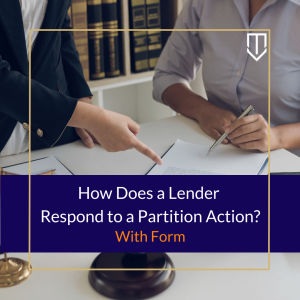 A declaration of non-monetary status is a special type of court filing reserved for trustees under
A declaration of non-monetary status is a special type of court filing reserved for trustees under 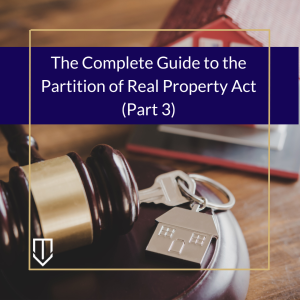 How does the court appraise the property (CCP § 874.316)?
How does the court appraise the property (CCP § 874.316)?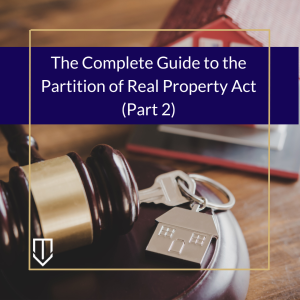
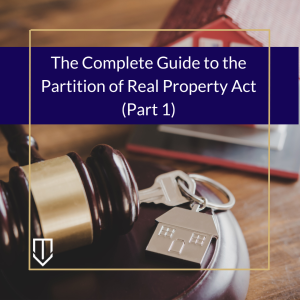 It’s rare that a new law comes along that turns an entire established legal practice on its head. Yet that’s precisely what California’s Partition of Real Property Act intends to do. Revised in 1976,
It’s rare that a new law comes along that turns an entire established legal practice on its head. Yet that’s precisely what California’s Partition of Real Property Act intends to do. Revised in 1976,  The attorney-client privilege is well-known for a reason. It is a tenant of the legal profession, allowing for clients to approach attorneys with honesty and sincerity without fear that what they say will ever “leave the room,” so to speak.
The attorney-client privilege is well-known for a reason. It is a tenant of the legal profession, allowing for clients to approach attorneys with honesty and sincerity without fear that what they say will ever “leave the room,” so to speak.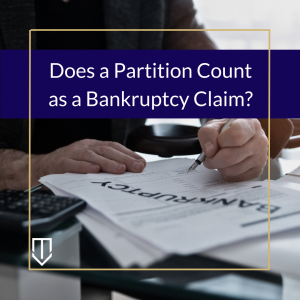 Yes, it can. Partitions and bankruptcy can interact in unusual ways despite the fact that they can often seek the same thing: the sale of a piece of property.
Yes, it can. Partitions and bankruptcy can interact in unusual ways despite the fact that they can often seek the same thing: the sale of a piece of property.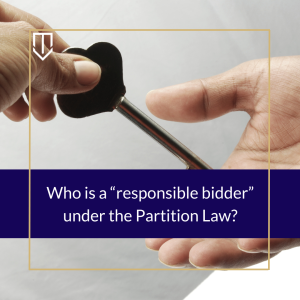 Under the Partition Law, “[a] bidder is responsible if it can perform the contract as promised.” (PCC § 20162; Valley Crest Landscape, Inc. v. City Council (1996) 41 Cal.App.4th 1432, 1438.) That means, in essence, that it can be determined from the face of the bid itself that it will be viable, without outside investigation or information. (Taylor Bus Service, Inc. v. San Diego Bd. Of Education (1987) 195 Cal.App.3d 1331, 1342.)
Under the Partition Law, “[a] bidder is responsible if it can perform the contract as promised.” (PCC § 20162; Valley Crest Landscape, Inc. v. City Council (1996) 41 Cal.App.4th 1432, 1438.) That means, in essence, that it can be determined from the face of the bid itself that it will be viable, without outside investigation or information. (Taylor Bus Service, Inc. v. San Diego Bd. Of Education (1987) 195 Cal.App.3d 1331, 1342.)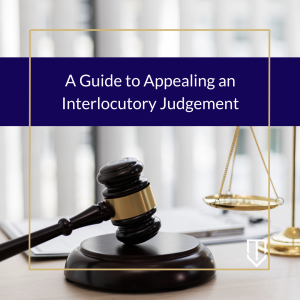 Does the appeal of an interlocutory judgment automatically stay the partition case?
Does the appeal of an interlocutory judgment automatically stay the partition case? Can a Tenant in Common Force a Sale?
Can a Tenant in Common Force a Sale?